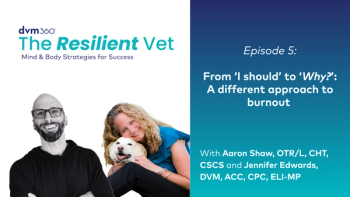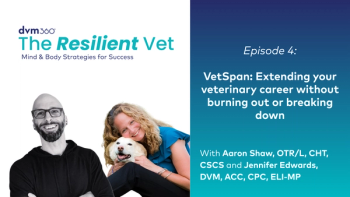
The unlikely face of addiction
Veterinarians are bright, independent people, and they can hide addiction and depression for years. But this doctor proves good things can happen when the ugly truth comes to light.
Death. Prison. Recovery. These are the choices an addict faces. They were the choices I faced in March 1987.
I'd graduated from veterinary school nine months before. I was sixth in my class with a 3.89 GPA. I looked good on the outside, with a prestigious academic internship at Auburn University as my first job. My accomplishments propped up the fantasy that my life was normal despite daily amphetamine and alcohol use and struggles with bulimia and depression. Having grown up with addicted adults in my childhood as well as physical violence and sexual abuse, my concept of "normal" was somewhat warped in the first place.
And my reality in early 1987 was anything but normal. I was almost completely isolated, unable to care for myself and increasingly unable to care for my patients. I was profoundly depressed and contemplating suicide. I had begun using controlled substances from the school's hospital—something to bring me down, then something to wake me up enough so that I could work. The interns working with me noticed that I reeked of anesthetic and was sliding downward fast. All that was left was the job. It was how I got money to feed my addictions, and it was the last thing I could hold up to show that everything was OK, even though it wasn't.
Everything came to a head one night when I was on call. A receptionist called me to come in, but I was noticeably drunk on the phone. After that, a group of students and faculty reached out to me and forced me to confront my addiction. They saved my life.
I was given the opportunity to participate in a program for chemically dependent physicians rather than being prosecuted for drug theft. Perhaps with divine inspiration, I made the right choice. I accepted help.
One day at a time
I am here today, 20 years sober, both inwardly healthy and outwardly successful and joyously participating in a profession that I love. Staying sober has required ongoing participation in 12-step programs and changes in my lifestyle. It requires plenty of effort and persistence on my part. But compared to the time and energy it took to lead a duplicitous, tortured existence as a using addict, it's minimal. Recovery has been more than a human salvage operation for me. I have been returned to life, empowered as an individual to live with enthusiasm and passion.
I've learned many things on this journey. First, addiction is a brain-biochemistry issue, not one of failed self-control or moral depravity. If I could have stopped, I would have. Quitting was not possible without help—even in the face of severe external consequences. And I've seen other veterinarians die as a result of their addictions rather than admit they're not in control of their drug abuse.
Our profession attracts self-motivated, highly critical, overachieving perfectionists. As observed by Dr. Joe Gloyd from the AVMA Wellness Committee, these are also characteristics common to addicts as well as people raised in addicted households. These tendencies, combined with ready access to controlled substances and sometimes lax drug accountability, means addiction is overrepresented in the veterinary community compared to the general population. This is neither good nor bad; it simply is. Being aware of addiction allows us to recognize colleagues in trouble and to help each other if the need arises.
Extreme self-sufficiency and determination are lauded in our industry. We're tough and proud of it. We expect much of ourselves, as evidenced by the ever-popular "Real doctors treat more than one species" T-shirt. We often regard ourselves as more resourceful than other medical professionals. This fosters a culture in which admitting a personal need or asking for help is anathema. For addicts, this culture helps keep us ill. It also means that our profession maintains high levels of denial; we don't want to even suggest that a veterinarian is exhibiting impairment or need.
Recovery is a journey
Achieving both personal and professional goals involves a series of small steps. I was once completely goal-oriented—I had to become board-certified or I was crap. It was all or nothing. Now I appreciate the journey along the way, and my self-esteem isn't tied only to the goal. What I could not envision doing for a lifetime I can do for today.
Many days of sobriety have accumulated into decades; many small efforts have resulted in a family that loves me, a community that understands me, and professional acclaim. None of this required me to go it alone without guidance or support from others. Admitting error and need has not been fatal. It adds to the emotional richness of my life and connects me to others who are as afraid of inadequacy as I am.
Along with connections to others, I've also found a connection to a higher power. I no longer disdain spirituality as the opiate of the masses. It is instead the force that allows me to live with my addiction without using. It energizes me and gives meaning to my daily actions.
Emotional transformation is an active process. It can happen only when we take action rather than try to satisfy unmet needs. It's not about getting the loving and accepting parent we feel we should have had, but about being an appropriate mentor to others now. It's about facing my own continued dishonesty and arrogance by helping another addict on his or her own painful journey. It's about healing through sharing, not about coveting. The gifts of this process are life-changing for all involved.
What I live for
I have found joy through service and improving my own small corner of the world. Each day presents new opportunities and challenges, but I'm never alone. I have a community and my faith to bolster me. Gratitude is a must, even in my darkest moments as I remember the specter of suicide during my active addiction. I face each day in awe and wonder and try to find meaning in the smallest acts.
Dr. JoAnne Roesner owns Loving Hands Animal Clinic in Alpharetta, Ga.
Newsletter
From exam room tips to practice management insights, get trusted veterinary news delivered straight to your inbox—subscribe to dvm360.




